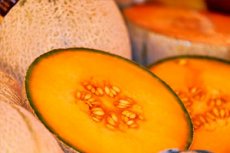Medical expert of the article
New publications
Can a breastfeeding mom have melon in the first month?
Last reviewed: 04.07.2025

All iLive content is medically reviewed or fact checked to ensure as much factual accuracy as possible.
We have strict sourcing guidelines and only link to reputable media sites, academic research institutions and, whenever possible, medically peer reviewed studies. Note that the numbers in parentheses ([1], [2], etc.) are clickable links to these studies.
If you feel that any of our content is inaccurate, out-of-date, or otherwise questionable, please select it and press Ctrl + Enter.

The diet of a nursing mother is a very important topic, since the newborn receives all the necessary nutrients with mother's milk. Despite the fact that in the womb they had a common "menu", once in a different environment, the baby's digestive and immune systems are subject to great stress. The immature intestines do not accept all the products that are desirable for the mother, and as a result - rashes on the baby's skin, redness, peeling, loose stool, intestinal colic. Therefore, doctors insist on sticking to a diet in the first month of the baby's life, and then gradually introducing new products and monitoring his reaction. Summer brings with it many temptations in the form of various vegetables, fruits, berries - you want to get your fill of vitamins and pass them on to the baby. A woman should give preference to low-allergenic products. Is there a place for melon during breastfeeding?
Benefits of Melon
Melon is a controversial product, because along with the benefits it can also cause harm. This melon crop is a real repository of useful elements: organic, unsaturated fatty acids, vitamins A, C, E, group B, iron, potassium, calcium, magnesium, sodium, sulfur, phosphorus, manganese, copper, etc. In folk medicine, it is used as a remedy for stomach diseases, liver, mental disorders, tuberculosis, rheumatism, as a diuretic and anthelmintic. All its useful qualities are very useful for a growing organism, especially ascorbic and folic acid. The first strengthens the immune system, protecting against colds, the second regulates the processes of hematopoiesis. Calcium, which melon is rich in, is necessary for the development of the skeletal system, iodine and phosphorus - for the brain. The presence of a high water content in it has a positive effect on water-salt metabolism and the functions of the gastrointestinal tract. A number of antioxidants in its composition: zeaxanthin, choline, beta-carotene - reduce the risk of many diseases. All these characteristics speak in favor of melon in the menu of a nursing mother. But not everything is so simple with it. When overeating, and this often happens due to its excellent taste, intestinal disorders and heaviness in the epigastrium occur. The body can be oversaturated with vitamins, and hypervitaminosis can manifest itself in various symptoms, depending on the excess of one or another vitamin. In addition, melon is very allergenic. Several rules will help you maneuver between benefit and harm:
- do not buy before August - the period of natural ripening, when all the useful elements have accumulated in it;
- know how to choose - good quality is indicated by a pleasant distinct aroma, a dull sound when patted, and the absence of cracks and stains on the surface;
- do not eat on an empty stomach;
- do not combine with other products, especially those that contain a lot of starch;
- Use in small portions and observe the child after breastfeeding. If there is no reaction, you can repeat.
A big plus for those mothers who manage to painlessly diversify their table with this delicacy. It will add strength, vigor, strengthen the body, help get rid of depression, because many women suffer from decline and depressed mental state after childbirth.


 [
[